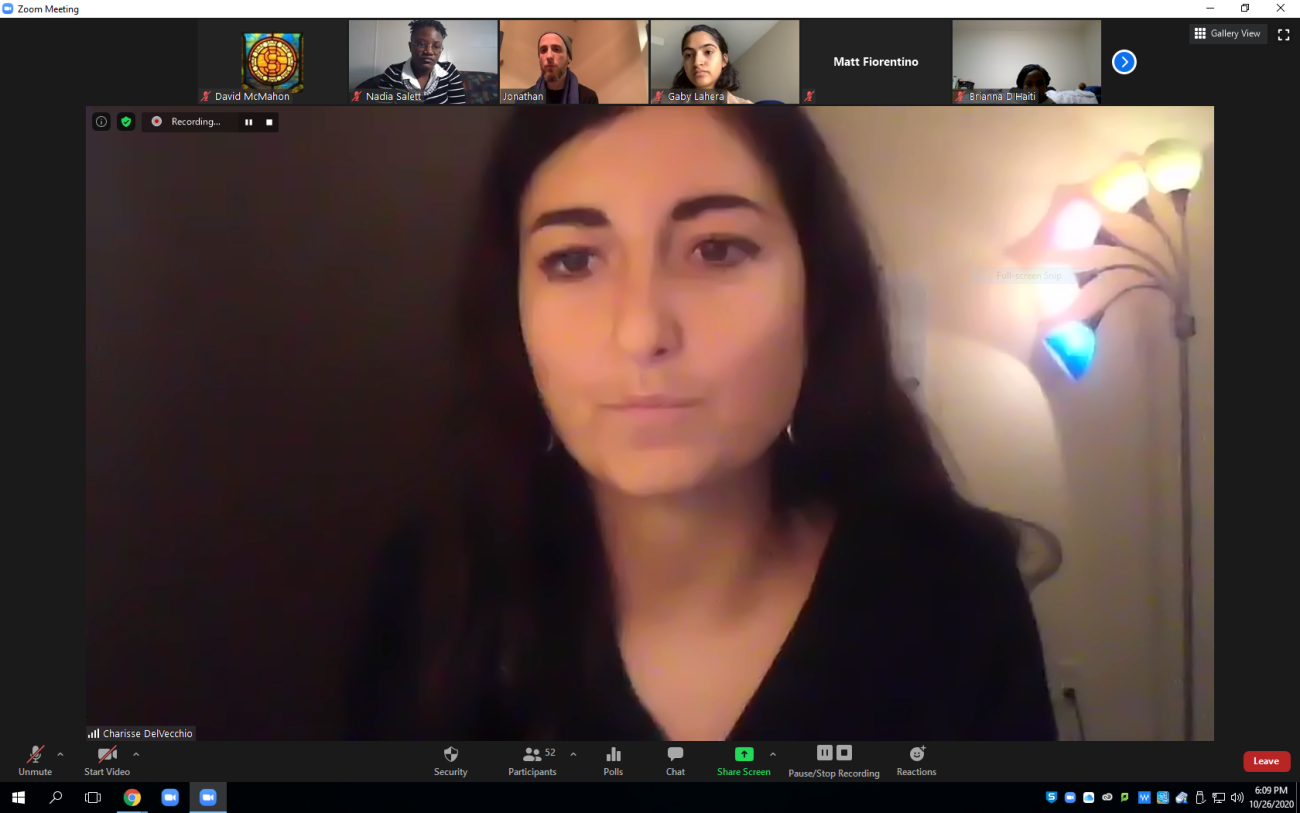The Impetus Behind SEAT at the Table Week at Springfield College

Charisse DelVecchio, OMA graduate assistant, was one of the event's organizers and helped welcome attendees throughout the week.
The Impetus Behind SEAT at the Table Week
Summer 2020 was filled with many emotions, but for Black, Indigenous, and people of color, specifically for those who identify as Black/African American, it was traumatic. During these moments, the Office of Multicultural Affairs (OMA) staff jumped into action to come up with a fall semester plan to approach what was happening in the country. This plan included creation of an extensive diversity conference called (S)ocial justice (E)quity (A)ccountability (T)ransformation (SEAT) at the Table Week. Charisse DelVecchio, OMA graduate assistant; Felicia Lundquist, director of OMA; and Luther Wade, Class of 2021, got together to talk about the planning process and the impact they’ve seen from SEAT at the Table Week.
“The OMA staff established a Collaborative Council of faculty, staff, and students around campus. Collaborative Council members met biweekly throughout the fall semester to support conference organizing by helping with advertising and outreach, providing feedback, sharing ideas, and recruiting presenters and volunteers,” DelVecchio said. “The Collaborative Council members collected student feedback about what topics should be addressed during SEAT at the Table Week, and prioritized outreach to community members who could facilitate sessions on those topics.”
Presenters submitted session proposals, and 40 total sessions were accepted to be included in the final program. Session criteria required that every session address a system of oppression. All proposed sessions were accepted. Following students’ request, a keynote speaker was incorporated to commence the week of programming.
OMA and the Collaborative Council members contacted 30-plus community organizations and educational institutions around the country to establish partnerships. Community partners shared conference Web pages, including the registration form, with their networks. Social media and email also were used for outreach.
“Over 2,000 people from around the country and outside the U.S. joined the inaugural SEAT at the Table Week. Sessions covered issues including white privilege, classism, racism, colorism, sexism, heterosexism, transphobia, LGBTQIA+ inclusion, health and healthcare equity and access, ableism, accessibility, capitalism, the ‘N’ word, stereotypes, dehumanization, community interventions, higher education, Indigenous rights, and art. Sessions, on average, included 80 attendees each. Sessions were made available via YouTube following the event,” DelVecchio said.
Wade offered thoughts on his experience facilitating the session “N-Side the N-Word” and what impact these events made on the campus.
“This week was good for starting the conversation for some people and continuing the conversation for a lot of others. It was a great way to get students out of their bubble and passionate about other people’s differences, rights, and how they’ve been treated,” Wade said. “I hope the conversations and programs continue and that people continue to work towards making the campus a more inclusive and more diverse place. And I hope people don’t interpret this week as the one-time conversation on diversity. I think it should have happened and we’re in a much better place as a campus that it did happen.”
The feedback received on the sessions confirms that this week was truly incredible. One participant stated, “SEAT at the Table Week should happen every semester. It was extremely eye-opening to myself and it sparked conversations between friends. It was the best event I have ever attended in my four years at Springfield.”
This conference provided a space for students, faculty and staff, and community members to come together to learn, listen, process, and make a change.
“In short, I do want to express that I am extremely pleased and proud of our staff, students, and collaborative commUNITY who helped to offer a deeper understanding of advocacy, activism, and the value of academic freedom as it pertains to scholarship. I was both excited and pleased to see the development of social change leadership and the risks our change agents and scholars took, particularly student scholars to highlight and offer perspective around awareness raising, systemic oppression, institutional racism, environmental justice, activism, advocacy, allyship/accompliceship, to name a few,” Lundquist said. “Moreover, a SEAT at the Table offered both a platform and an opportunity for ‘underrepresented’ offices and historically marginalized individuals to be more visible with amplified voices; simultaneously calling attention to growing movements such as BLM, the importance of mental health, access, diversity, inclusion, and equity while making social justice advocacy a clearer presence in the pursuit of empowering folks, building and/or constructing knowledge, and cultivating social change.”
For those who did not have a chance to virtually attend a session, be sure to check out videos of many of the presentations.
— Brianna Kirk, Charisse DelVecchio, Felicia Lundquist, and Luther Wade

